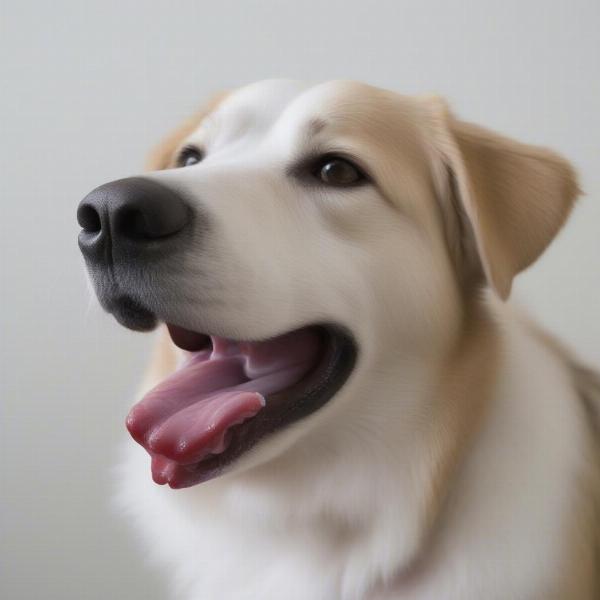Understanding the costs associated with salivary mucocele surgery in dogs is a common concern for pet owners. This article will delve into the factors affecting the price, offer tips on finding affordable options, and discuss the surgical procedure itself.
Understanding Salivary Mucoceles in Dogs
 Salivary Mucocele Symptoms in Dogs
Salivary Mucocele Symptoms in Dogs
A salivary mucocele is a fluid-filled swelling caused by a ruptured salivary gland or duct. While not typically painful, it can interfere with your dog’s eating, drinking, and breathing depending on the location. There are several types of mucoceles, including sublingual (under the tongue), cervical (in the neck), and pharyngeal (in the throat). Each type presents different challenges and may influence the overall surgical cost. Recognizing the symptoms early is crucial.
Factors Influencing Salivary Mucocele Dog Surgery Cost
The cost of salivary mucocele surgery can vary significantly based on several key factors.
- Geographic Location: Veterinary costs often reflect the local cost of living. Prices in metropolitan areas tend to be higher than in rural locations.
- Veterinary Clinic: Specialty hospitals or emergency clinics may charge more than general practice veterinarians.
- Severity and Complexity: The size and location of the mucocele can impact the complexity of the surgery. For instance, pharyngeal mucoceles are generally more challenging to remove than sublingual mucoceles.
- Diagnostic Tests: Pre-operative bloodwork, imaging (X-rays or ultrasound), and fine-needle aspiration can add to the overall cost.
- Post-operative Care: Medications, follow-up examinations, and potential complications can contribute to additional expenses.
Finding Affordable Options for Salivary Mucocele Surgery
While cost is a factor, your dog’s health is paramount. Don’t compromise on quality care. Here are some ways to explore more affordable options:
- Pet Insurance: If you have pet insurance, check your policy for coverage of salivary mucocele surgery.
- Payment Plans: Many veterinary clinics offer payment plans or work with financing companies to make treatment more manageable.
- Charitable Organizations: Some animal welfare organizations offer financial assistance for veterinary care to eligible pet owners.
- Veterinary Schools: Veterinary schools often provide discounted services performed by supervised students.
What to Expect During and After Surgery
The most common surgical approach involves removing the affected salivary gland(s) entirely to prevent recurrence. This typically requires general anesthesia. Your veterinarian will discuss the specific procedure with you, including pre-operative instructions and post-operative care. Recovery usually involves pain management, monitoring for complications, and preventing your dog from licking or chewing the surgical site (often using an Elizabethan collar).
Conclusion
Salivary mucocele surgery is an important procedure to address this condition in dogs. While costs can vary, prioritizing your dog’s health is crucial. By understanding the factors influencing the cost and exploring available options, you can ensure your furry friend receives the necessary care without breaking the bank. Remember to consult with your veterinarian for a personalized assessment and treatment plan.
FAQ
- What are the signs of a salivary mucocele in a dog? Swelling under the jaw, tongue, or neck is a common sign.
- Is salivary mucocele surgery painful for dogs? While the condition itself isn’t usually painful, the surgery requires general anesthesia and post-operative pain management.
- Can salivary mucoceles go away on their own? While some may spontaneously drain, they often recur. Surgery is the recommended treatment for permanent resolution.
- What is the recovery time for salivary mucocele surgery in dogs? Most dogs recover within 2-3 weeks.
- Are there any alternatives to surgery for salivary mucoceles? While aspiration can temporarily drain the fluid, it’s not a long-term solution and surgery is usually recommended.
- How can I prevent salivary mucoceles in my dog? Unfortunately, there’s no known preventative measure as the exact cause is often unknown.
- Is salivary mucocele surgery always successful? The surgery is generally successful in resolving the condition, especially when the affected gland is removed.
About ILM Dog: ILM Dog is your trusted resource for comprehensive dog care information, covering everything from breed selection and health to training and nutrition. We offer expert advice and practical tips to help you navigate all aspects of dog ownership. Contact us today for personalized guidance: Email: [email protected], Phone: +44 20-3965-8624.